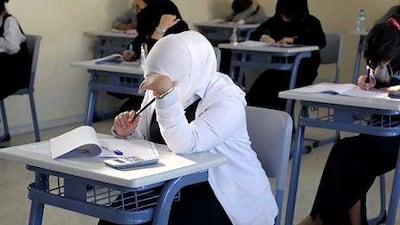Significant and growing numbers of young people across the Middle East and North Africa (Mena) are being inadequately taught and are emerging from education systems with little or no employment prospects.
The evidence of underperformance in the region is well documented: low literacy rates; low secondary and higher education enrolment; high drop-out rates; and high levels of unemployment.
Basic schooling, the standard of which is taken for granted elsewhere, is falling short. Education systems struggle to attract and retain good staff and use old teaching methods with traditional models of learning, which leave students poorly equipped to function in more modern, knowledge-based economies.
Good-quality education is a contributor to economic growth. Although there has been progress recently, it does not seem to have translated into such growth - and jobs for many. Reasons might include low-quality schooling and education systems, but more plausible is that the lack of growth is symptomatic of structural imbalances in Mena economies.
The absence of a vibrant private sector is critical. Unlike more mature developed economies, the Mena region does not have an ageing population, but one dominated by a large proportion of young people; two thirds of the population across the region are below 24 years old. They are being short-changed, with the largest numbers in Egypt, Tunisia, Iran, Iraq and Libya.
The issue has contributed to recent outbreaks of public unrest in parts of the Mena region.
Despite increasing levels of spending across much of the region, expectations have not been met. Basic schooling has not delivered the necessary levels of mathematics and literacy, meaning many young people are unemployable in any occupation requiring numeracy and communication skills. Greater emphasis is required on science and mathematics; currently almost two thirds of students graduate in social sciences and humanities. There is an insufficient supply of students with competencies best suited to the economic development needs of the region. The mismatch between expectations and economic return are most acute for those who have progressed to higher education: there is insufficient payback.
As a result, many young people feel not only disillusioned and economically disenfranchised, but also powerless to influence change for the better.
What does the vision of "better" look like? Better outcomes at primary, secondary and tertiary levels are all essential as is a focus on technical skills. The three components that can help to improve quality and develop systems responsive to the needs of economies are: resources - study after study reinforces the need for high-calibre teaching staff as the main driver for successful educational outcomes.
Experience needs to be imported, which is often expensive and transient in nature; performance management - often anathema to the teaching profession, but the need to link rewards and incentives to educational results is an imperative; accountability to stakeholders - herein lies what is perhaps one of the key issues at the heart of the Mena protesters' complaints: the opportunity to influence how systems such as education and health are constructed and financed.
Options leaders and policymakers should consider include: giving more power to the people - be willing to cede control to the local or institutional level and allow people to influence the shape of education institutions, the ownership of institutions, or to play a role with schools that enables them to influence what education is delivered and how; playing the role of market-maker by acting as a regulator and a buyer of services, not a provider - governments should consider extending the role of the private sector by developing closer ties to industry and commerce and becoming more responsive to their needs. This may mean being prepared to partner in new ways; focus on delivering more vocational training that delivers increased employment rates - programmes that do not require four-year commitments for the prestige of a degree.
Now more than ever, Mena governments need to think and act radically in reforming and investing in their education systems to secure sustainable change.
Sally Jeffery is an advisory partner for PricewaterhouseCoopers in the Middle East, Duncan Lampard is the director of education and Jumana Salti is the senior manager of education

